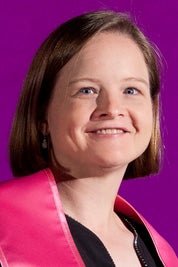Perkins represents PhET at Microsoft Awards
Kathy Perkins, director of PhET Interactive Simulations in the University of Colorado Boulder Department of Physics, accepted the $50,000 Microsoft Education Award on behalf of the program at the 2011 Tech Awards banquet in San Jose, Calif., on Oct. 19.
The Tech Awards, a signature program of The Tech Museum in San Jose, selected PhET from among hundreds of nominations representing 54 countries. Earlier in October, 15 innovators from around the world were named laureate finalists for the awards for applying technology in practical ways to resolve some of the world's most challenging issues. The finalists spent a week in Silicon Valley meeting with business leaders and philanthropists. Five programs, including PhET, were awarded $50,000 top prizes.
PhET was created by Carl Wieman in 2002 to make science accessible and meaningful to everyone. PhET was designed to provide fun, interactive, research-based simulations of physical phenomena for free. PhET has created more than 100 simulations for teaching and learning science and math. Going beyond traditional educational resources, PhET simulations offer an intuitive, game-like environment where students can learn through scientist-like exploration, where dynamic visual representations make the invisible visible, and where science ideas are connected to real-world phenomena. These simulations are widely used by K-12 and university students and instructors worldwide.
PhET simulations have been translated into 64 languages by volunteer teachers and scientists throughout the world, allowing students to access these high-quality science teaching and learning tools in their own language. In 2011, the simulations will be used more than 22 million times, reaching more than 200 countries and territories around the world.
PhET has been generously supported by Carl Wieman, the Hewlett Foundation, the O’Donnell Foundation, the National Science Foundation, King Saud University, the Kavli Foundation, and the University of Colorado.


